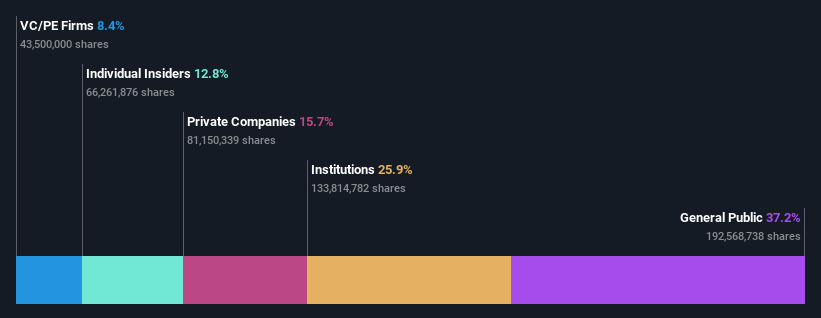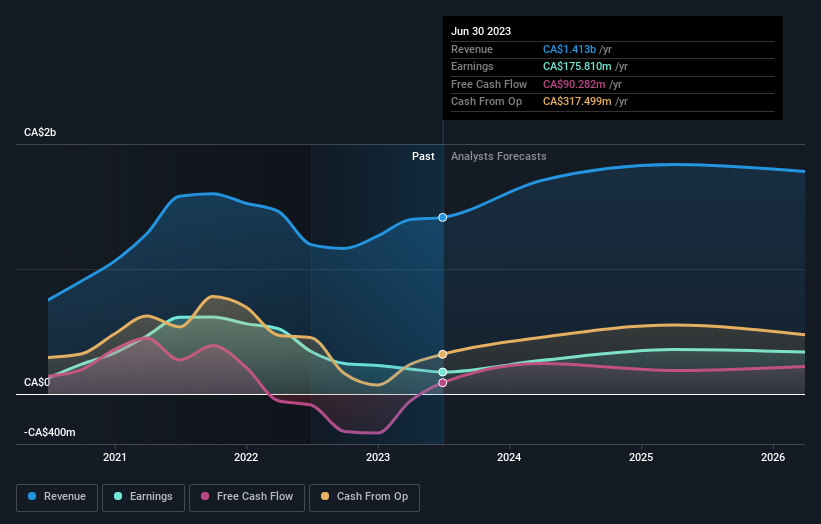Both individual investors who control a good portion of Champion Iron Limited (ASX:CIA) along with institutions must be dismayed after last week's 4.0% decrease
Key Insights
Significant control over Champion Iron by individual investors implies that the general public has more power to influence management and governance-related decisions
The top 13 shareholders own 50% of the company
To get a sense of who is truly in control of Champion Iron Limited (ASX:CIA), it is important to understand the ownership structure of the business. The group holding the most number of shares in the company, around 37% to be precise, is individual investors. In other words, the group stands to gain the most (or lose the most) from their investment into the company.
While institutions, who own 26% shares weren’t spared from last week’s AU$118m market cap drop, individual investors as a group suffered the maximum losses
Let's take a closer look to see what the different types of shareholders can tell us about Champion Iron.
View our latest analysis for Champion Iron
What Does The Institutional Ownership Tell Us About Champion Iron?
Institutional investors commonly compare their own returns to the returns of a commonly followed index. So they generally do consider buying larger companies that are included in the relevant benchmark index.
We can see that Champion Iron does have institutional investors; and they hold a good portion of the company's stock. This implies the analysts working for those institutions have looked at the stock and they like it. But just like anyone else, they could be wrong. If multiple institutions change their view on a stock at the same time, you could see the share price drop fast. It's therefore worth looking at Champion Iron's earnings history below. Of course, the future is what really matters.
Hedge funds don't have many shares in Champion Iron. Because actions speak louder than words, we consider it a good sign when insiders own a significant stake in a company. In Champion Iron's case, its Top Key Executive, William O’Keeffe, is the largest shareholder, holding 8.7% of shares outstanding. Investissement Québec, Investment Arm is the second largest shareholder owning 8.4% of common stock, and WC Strategic Opportunity, L.P. holds about 8.1% of the company stock.
After doing some more digging, we found that the top 13 have the combined ownership of 50% in the company, suggesting that no single shareholder has significant control over the company.
Researching institutional ownership is a good way to gauge and filter a stock's expected performance. The same can be achieved by studying analyst sentiments. There are a reasonable number of analysts covering the stock, so it might be useful to find out their aggregate view on the future.
Insider Ownership Of Champion Iron
The definition of an insider can differ slightly between different countries, but members of the board of directors always count. Management ultimately answers to the board. However, it is not uncommon for managers to be executive board members, especially if they are a founder or the CEO.
I generally consider insider ownership to be a good thing. However, on some occasions it makes it more difficult for other shareholders to hold the board accountable for decisions.
It seems insiders own a significant proportion of Champion Iron Limited. It is very interesting to see that insiders have a meaningful AU$363m stake in this AU$2.8b business. It is good to see this level of investment. You can check here to see if those insiders have been buying recently.
General Public Ownership
With a 37% ownership, the general public, mostly comprising of individual investors, have some degree of sway over Champion Iron. While this group can't necessarily call the shots, it can certainly have a real influence on how the company is run.
Private Equity Ownership
With an ownership of 8.4%, private equity firms are in a position to play a role in shaping corporate strategy with a focus on value creation. Some investors might be encouraged by this, since private equity are sometimes able to encourage strategies that help the market see the value in the company. Alternatively, those holders might be exiting the investment after taking it public.
Private Company Ownership
Our data indicates that Private Companies hold 16%, of the company's shares. Private companies may be related parties. Sometimes insiders have an interest in a public company through a holding in a private company, rather than in their own capacity as an individual. While it's hard to draw any broad stroke conclusions, it is worth noting as an area for further research.
Next Steps:
I find it very interesting to look at who exactly owns a company. But to truly gain insight, we need to consider other information, too. Be aware that Champion Iron is showing 2 warning signs in our investment analysis , you should know about...
But ultimately it is the future, not the past, that will determine how well the owners of this business will do. Therefore we think it advisable to take a look at this free report showing whether analysts are predicting a brighter future.
NB: Figures in this article are calculated using data from the last twelve months, which refer to the 12-month period ending on the last date of the month the financial statement is dated. This may not be consistent with full year annual report figures.
Have feedback on this article? Concerned about the content? Get in touch with us directly. Alternatively, email editorial-team (at) simplywallst.com.
This article by Simply Wall St is general in nature. We provide commentary based on historical data and analyst forecasts only using an unbiased methodology and our articles are not intended to be financial advice. It does not constitute a recommendation to buy or sell any stock, and does not take account of your objectives, or your financial situation. We aim to bring you long-term focused analysis driven by fundamental data. Note that our analysis may not factor in the latest price-sensitive company announcements or qualitative material. Simply Wall St has no position in any stocks mentioned.


